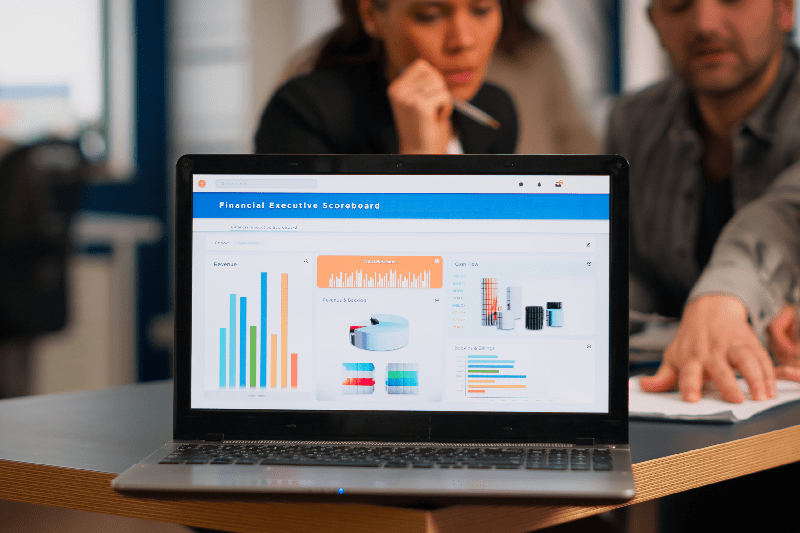Managing the way your business takes care of its bookkeeping is essential, so there may come a point at which you decide it’s time for new bookkeeping software. This could be for a whole host of different reasons such as:
- Your current software is holding you back or stunting your growth
- You don’t like the user interface of your current software and want something simpler or just different
- You want to reduce the amount you’re spending on bookkeeping software or you’re willing to start spending more to unlock additional tools and features
- You need to move to a bookkeeping software that is compliant with Making Tax Digital (MTD)
Although sometimes necessary, switching bookkeeping software can be daunting or stressful, but we’re here to help. We’ll explore when the best time to change bookkeeping software might be, focusing on the pros and cons of different times of the year.
We’ll also share our tips on how to make the transition as smooth as possible and how you could benefit from the support of an accountant.
When is the best time to switch bookkeeping software?
Annoyingly, there isn’t one simple answer to this question. It’s just about finding the right time for your business and when it makes the most sense for you based on what you’ve got going on.
For example, if a business is going through any major changes, this could be the ideal time to make the transition to new bookkeeping software. Examples of major changes include:
- Merger or acquisition
- Restructuring
- Rebranding
- Entering a new phase of growth
- Preparing for rule changes such as Making Tax Digital
Kickstarting the new period of change with brand-new bookkeeping software could be the way to go, but the decision is yours.
That said, there are some important considerations to keep in mind for specific times in the tax year.
Year-end
Kickstarting a new bookkeeping software system in time for the start of a new financial year is a popular option for a lot of businesses because it means everything for the year is in one place.
Making the transition ahead of a new year starting in your books means you can have more of a ‘clean break’, rather than trying to carry the details over into your new system.
A mid-year transition will require you to figure out if recreating your existing accounts in the new system is the best option, or if it would make more sense to enter the ‘closing balance’ (literally the balance of your accounts when you close the old system) as the opening balance in your new system at the point you decide to move over.
That said, whilst the end of the tax year will be the easiest option for many businesses, it won’t be for everyone. If your business has a spike of activity towards year-end, for example, this time would be best avoided so you can just focus on managing the peak period.
Just like you can swap your accountant any time, you can move your bookkeeping to a new provider whenever you need to.
End of a quarter
If switching software at year-end isn’t the most convenient option for you, you could consider transitioning by the close of a quarter instead. This means you can start the next quarter afresh with your new bookkeeping software up and running.
This might be particularly useful if your business is VAT-registered. Transitioning at the change of VAT quarters could help to minimise the risk of errors in your VAT return, or disruption to workflow.
During quiet business periods
The other option is to wait until you know your business will go through a quieter period – if it has one!
If business slows down during the festive period, for example, you could start the process and be ready to hit the ground running with a new bookkeeping system in the new year.
Making the switch during quieter periods means there will be less chance of disrupting your regular services, which is good news for you and your customers.
How long will it take to switch bookkeeping software?
Setting up an account with a new software provider shouldn’t take long at all. In fact, you can normally set up an account in a matter of minutes. The process of actually moving any existing data over from one system to another can take longer, although this depends on what you’re moving from, and to.
Most bookkeeping software includes export tools so you can download your existing records, as well as import tools so you can upload it all into your new provider. Just be aware that some providers will paywall your data (even though it’s yours!), so make sure that you export everything you need before you stop paying the bill.
Don’t forget, you’ll also need to leave plenty of time to train yourself and any other employees on how to use the new system and its features.
Other ways to ensure a smooth transition
- Running both bookkeeping software systems – the old one and the new one – at the same time for a while to take the pressure off
- Make sure you have a point of contact or support from the software provider you’re moving over to
- Ask a professional accountant or bookkeeper to help you
Do I need an accountant to help me switch bookkeeping software?
If you’ve got the time, the know-how and the confidence, it’s entirely possible to change bookkeeping software yourself. Doing it yourself will also save you the cost of getting a professional to help.
However, there are many benefits worth considering to having an accountant help you with the transition, including:
- Reduced risk of error: An accountant will help make sure all your financial information is transferred correctly to limit the risk of any mistakes being made with your accounts.
- Troubleshooting and training: Finding your way around new software and learning how to use all of its features can take time and effort. An accountant can show you the ropes and help you solve any issues along the way.
- Compliance: While getting used to your new bookkeeping software, an accountant can keep a close eye on ensuring your record keeping stays in line with the various rules and regulations.
Looking for more support with your business finances? Compare accountants, learn more about bookkeeping software, or ask an accountant a tax question.






